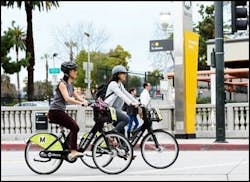L.A. Metro Announces Launch Dates for Bike Share Expansions in Pasadena and the Port of Los Angeles
Working closely with the cities of Pasadena and Los Angeles, the Los Angeles County Metropolitan Transportation Authority plans to launch bike sharing in Pasadena on Friday, July 14, and at the Port of Los Angeles on Monday, July 31. Metro will announce the date for its third bike share launch in the city of Venice in the near future. But combined, the region’s bike share expansions will result in approximately 1,400 bicycles at up to 125 stations.
“We are tremendously excited that Metro’s bike share program is expanding to new communities in L.A. County following our successful pilot launch in downtown L.A. last summer,” said John Fasana, Metro Board chair and mayor pro-tem of the city of Duarte. “Even more Angelenos can rent these bicycles for short trips as well as to make first mile, last mile connections to Metro’s robust bus and rail system.”
Bike sharing is an ideal transportation option for people to get where they need to go for local destinations that may be too far to walk but to short or inconvenient to drive. Metro has worked with cities to strategically place bike share stations near Metro stations to encourage both bicycle and transit trips. A single pre-registered Metro TAP fare card can serve as the key to both Metro Bus and Rail lines and the Metro Bike Share system, making it the most integrated with transit than any other system in the United States.
“Los Angeles is an incredible place to discover on two wheels — and now, we’re making it even easier for cyclists to explore,” said Mayor Eric Garcetti. “The expansion of the Metro Bike Share program is an example of our strong commitment to offering Angelenos more transportation choices, and making our region more sustainable.”
In Pasadena, Metro and its contractor, Bicycle Transit Systems, Inc., will install 30-plus stations throughout the city. Key destinations accessible via bike sharing will include Old Pasadena, Paseo Colorado, the Playhouse District, South Lake Avenue, Levitt Pavilion (Memorial Park) and Pasadena City College. Another key Pasadena destination will be the Rose Bowl. Riders traveling to and from stadium events will be able to take advantage of a bike sharing station there.
“The Metro Bike Share program offers a unique, shared economy means of transportation that is both economical and good for the environment by providing bikes as new mobility options that get people out of their cars for short trips around our beautiful city,” said Pasadena Mayor Terry Tornek. “We welcome Metro Bike Share and look forward to seeing our residents and visitors take advantage of this program.”
At the Port of Los Angeles, 13 new stations will be installed along the L.A. Waterfront area, providing bike access to Gateway Plaza and Fanfare Fountains, the Battleship IOWA, the Los Angeles Maritime Museum, the Catalina Sea and Air Terminal, the Downtown Harbor, Wilmington Waterfront Park and Ports O’ Call Village, among others.
“Bike share has many benefits, but most importantly it will encourage healthy communities in the Harbor,” said L.A. City Councilmember Joe Buscaino. “My family and I will certainly use the bike share to enjoy the LA and Wilmington waterfronts. Bike share will help connect all of the wonderful assets we already have at our waterfront and will be a key ingredient in the success of the new San Pedro Public Market.”
“Bike Share is a fun, environmentally friendly alternative to explore the L.A. Waterfront and its many attractions,” said Port of Los Angeles Executive Director Gene Seroka. “Besides reducing traffic, locals and visitors will have close-up views and beautiful rides on our waterfront paths.”
Metro is also studying the feasibility of future expansion to more than 20 other parts of the county, including North Hollywood, the San Gabriel Valley, East Los Angeles/Boyle Heights, Burbank, Glendale, Culver City, Palms and others. Metro seeks to create a regionwide system of more than 4,000 bicycles pending ongoing Metro Board approval.
Under Metro’s Bike Share business plan, Metro splits all costs with participating cities. Metro funds up to 50 percent of the program’s capital costs and up to 35 percent of the operations and maintenance costs.
“Metro’s cost-sharing agreements with cities ensures our program yields the biggest benefits possible for taxpayers,” said Phillip A. Washington, Metro CEO. “Working together, we can cost-effectively create a balanced transportation system that offers new mobility options within many of our region’s top destinations.”
Bicycle Transit Systems will operate the system with bikes and stations provided by BCycle, a unit of Trek Bicycles of Wisconsin. These companies have successfully launched and/or operate more than 40 bike share systems in metropolitan areas in the United States and abroad.
Metro originally launched bike sharing in downtown L.A. in July 2016. That system comprises 61 stations and approximately 700 bicycles throughout the downtown area. To date, more than 160,000 trips have been made on the system, with more than 380,000 miles traveled. Approximately 4,700 bike share passes have been sold. Metro’s bike share system has also helped remove more than 362,000 pounds of carbon dioxide from the air. Collectively, bike share riders have burned 10.5 million calories — equivalent to 10,000 pints of ice cream.


